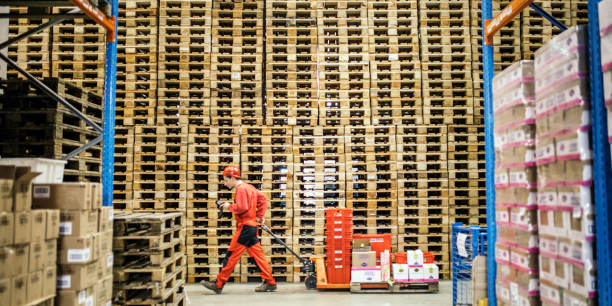
Navigate an unpredictable landscape with actionable, data-driven strategies tailored for your business from the brand down to the local level.

A new day, a new coronavirus headline. Over the last month, news outlets have reported extensively on the development and spread of the disease. While the threat to human life has (rightly so) been the main focus, COVID-19 is also posing difficult questions about the health of businesses, markets, and economies.
The outbreak is already infecting financial markets and economies around the world. In lock-down areas and special care zones, life has all but come to a complete standstill: businesses have closed their doors, factories have been shut down and staff sent home. Production has been massively curtailed, leading to supply problems and the threat of shortages.

Globally, the travel industry has inevitably taken a huge hit and international companies have started to feel the pinch. Apple has warned investors it will fail to meet its quarterly revenue target due to the “temporarily constrained” supply of iPhones and a dramatic drop in Chinese spending. Jaguar Land Rover, meanwhile, has said it could run out of car parts at its British factories if China does not deliver.
As the virus crosses borders, the economic impact is being felt in cities across Asia, Europe, Australia, and the Middle East. The public are staying at home to avoid getting sick (or spreading germs), which is negatively impacting restaurants, shops, and local businesses. While it’s impossible to know the full extent of the damage yet, Oxford Economics has predicted that coronavirus could cost the global economy more than $1tn in lost output if it turns into a pandemic.
With the “real world” seen as under threat, the online world takes on greater significance, providing vital access to necessities such as food, as well as information and entertainment.
It’s still too soon to accurately predict the virus’s long-term impact, but there is enough evidence to suggest lasting changes to our online behaviour and digital lives. As travel is suspended and we become more isolated, technology is already stepping in to bridge the gap.
While the growth of ecommerce is hardly breaking news, the emergence of a global virus appears to be driving a rapid rise in online shopping as people increasingly decide to buy their goods online (not to mention boredom driving those quarantined to impulse buying).
In some affected Chinese cities, ecommerce has already seen a massive boom. Stuck at home while many physical supermarkets, grocery stores, and restaurants remain forcibly shut, shoppers are looking to online delivery services to meet their needs.

This is not the first time this has happened. At the height of the SARS outbreak more than 15 years ago, Alibaba’s Taobao—an eBay-like digital marketplace—launched to massive and immediate success. Around the same time, Chinese retail giant JD.com moved into ecommerce after sensing a massive opportunity. A spokesperson for JD recently told Adweek: “The whole genesis of our company and ecommerce is because of the public health epidemic.”
History seems to be repeating itself as coronavirus creates a huge demand for JD.com. Over a 10-day period in January, the company’s fresh food sales reportedly jumped 215% to almost 15,000 tonnes. They’ve responded to the crisis and expanded their online food business, established a special transportation channel to prioritise produce, and launched a Mobile Fresh Basket program to deliver produce to more than 100,000 families in Hubei. In Beijing, they’ve even set up fruit and vegetable vending machines so consumers can buy produce without human contact.
In the UK (where the decline of the high street and the growth of ecommerce has already been well documented), the perceived threat of coronavirus is just one more reason retailers will need to rethink their online strategies and ensure visibility. Simple steps such as creating an effective SEO strategy for your ecommerce website can help improve your site’s ranking and drive traffic and sales long-term.
Subscribe to our monthly newsletter.
Lockdown in some cities has forced businesses to get creative and move into the digital space to remain relevant and profitable. With cinemas closed and music events cancelled for the foreseeable future, movies premieres have been shifted online and video streaming sites have begun gathering musicians to perform together virtually.

A number of DJs and clubs have responded with “cloud clubbing”—where people can watch live DJ sets and send in messages to give them the feeling that they’re in a club—and some gyms are offering workout classes online via WeChat so their customers can keep fit from home.
Perhaps unsurprisingly, tech giants are once again stepping in to capitalise on new opportunities, meet their consumers’ evolving needs, and stand up digital tools to help minimise the disruption of a global event.
For instance, with schools suspended and millions confined to working from home, both remote work apps and online education platforms are growing rapidly. Research from Sensor Tower shows that work apps like DingTalk all experienced significant year-on-year growth in downloads over January and February across China.
As time passes and we learn more about the virus, we’ll be better able to assess its impact on the way we engage with the digital world—from short-lived trends to lasting changes. Until then, keep washing those hands, focus on your business’s health, and check in with us regularly to keep your finger on digital’s pulse.
Navigate an unpredictable landscape with actionable, data-driven strategies tailored for your business from the brand down to the local level.
Navigate an unpredictable landscape with actionable, data-driven strategies tailored for your business from the brand down to the local level.
Navigate an unpredictable landscape with actionable, data-driven strategies tailored for your business from the brand down to the local level.
Subscribe to our monthly newsletter.